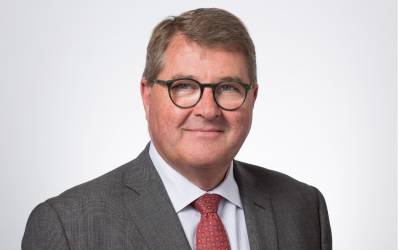Written by Professor Alan Thompson, Dean, Faculty of Brain Sciences and Pro Vice Provost (London), UCL
04 November 2020, issue 8

The past nine months have been a challenging time for us all with the coronavirus pandemic changing how we live, work and communicate with each other. Rewinding a few more months to July 2019 when I was appointed Pro-Vice-Provost (London), I did not foresee any of the challenges which we have all faced in 2020 and will continue to face in 2021 and beyond. Nevertheless, I am delighted to share that progress has very much continued in the PVP London Office, and if anything, COVID-19 has demonstrated the importance of UCL’s relationships particularly with London but also nationally and internationally as well.
This week, on 5th November, we will be launching our London Framework at a virtual launch event attended by our colleagues and partners across London. The London Framework sets out the key principles which define the purpose of UCL London. Our goal is to enhance engagement, coordinate relationships and enrich society whilst amplifying UCL’s impact in London. Whilst the London Framework is not a prescriptive way of working for UCL, it is instead a platform, a convener and a key supporter and advocate for all the work that is already underway across UCL’s departments and faculties in and for London.
It is no surprise that some 15,000 staff and 40,000 students want to live, study and work in a capital city as vibrant as London. London is a city of brilliance and despite all the restrictions that have been placed on our lives recently, people still want to engage with London and partake in all the wonderful offerings of the city, from culture to enterprise. UCL’s place in London is far-reaching too; its physical location spans Bloomsbury to Newham (with UCL East opening its doors in 2022) and its extensive contributions to the local economy, health service, environment, culture and socially are something to be celebrated. The pandemic has helped to reconnect UCL with London, as demonstrated by the fantastic COVID-19 research and community engagement documented over the past nine months.
Working with our local partners and communities is an important aspect of the London Framework and developing meaningful, reciprocal relationships is one of our key objectives. Given the breadth of UCL’s impact in London our audience is large and broad, however developing partnerships and building collaborations is what enriches UCL’s mission as London’s Global University. A fantastic example of one of these key relationships is that with the London Borough of Camden with whom we have been creating a Memorandum of Understanding (MoU) in concert with UCL Innovation & Enterprise, in particular Dr Michael Reynier and his team. With support from Jon Rowney, Executive Director of Corporate Services, London Borough of Camden, I’m delighted to say that on 18th November we will be holding a virtual signatory event, hosted by President and Provost, Professor Michael Arthur and Georgia Gould, leader of the London Borough of Camden. This not only demonstrates our commitment to working with our partners but also to our place in Bloomsbury and in London more broadly.
An excellent example of an area of work which has come out of the MoU and that helps to partner UCL with Camden is the Rapid Evaluation Advice and Learning Service (REAL). The REAL Service was set up in response to a request from Camden to assist in evaluating resident-facing services that needed to be re-engineered during the height of the COVID-19 lockdown. The service pairs Camden officers who have evaluation needs with experienced UCL staff who provide pro bono evaluation advice and guidance. REAL is an excellent example of how UCL can mobilise across faculties and professional services to make a positive and much needed contribution to its local community. The service is being extended until the end of November and is seeking academic or professional service colleagues with evaluation experience who could offer some of their time to help Camden. Find more information here.
These brief examples have very much been supported and guided by the London Advisory Group who have been a key advocate for our work to date. In addition it is very impressive to see the work of many UCL colleagues working in and for London, in particular the work of Professor Mariana Mazzucato and her work on The Renewal Commission in Camden; and Professor Henrietta Moore and the London Prosperity Index, amongst many others. Through the PVP London Office we strive to be a sponsor for all London-focussed work moving forward, including key initiatives such as these. It is critically important to align our work closely with many of UCL’s faculties, Vice-Provost Offices and Professional Services and as we have set out in our London Framework, this is a key way of working for the PVP London Office and in particular with Professor Paola Lettieri, Director of UCL East and with Collette Lux, Executive Director of Communications and Marketing. Lastly we recognise how important community and public engagement is to any London relationships and our close working with Laura Cream, Director of Engagement and Dr Olivia Stevenson, Head of UCL Public Policy will continue as we progress.
Finally, throughout this year many colleagues will have already had the opportunity to work with the PVP London Office and in particular my colleague Amy Lightstone who leads our work, based within the Office of the Vice-Provost (Advancement). As we continue to implement the London Framework and advance our relationships with London’s communities and organisations, I encourage you to connect with myself and Amy to discover how the PVP London Office can align with your London focussed activities and become a key advocate for your work.
 Close
Close

